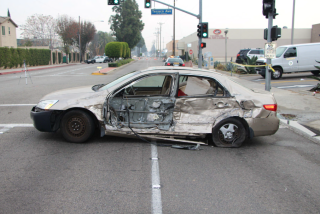Irvine Activist Going After Speeding Cops
“I’m not against the police. I’m just afraid of them.”
--Alfred Hitchcock
The first time we talked to reader John Jaeger, he started the conversation by telling us how much he respected cops and the danger and difficulty of their jobs. He quickly added that once he even donated blood for a wounded officer. He wanted to be sure we knew that he doesn’t do what he does because he hates cops. He does it because they scare him.
You see, Jaeger has been policing the police--and with considerable risk. Since 1993, the Irvine resident has been waging a one-man campaign to report cops who speed down freeways and roads without their lights and sirens on, often in violation of department policies and the law. But to catch them, he has to chase them. And that’s a problem.
It all started in 1993 when Jaeger was pulling onto the northbound Santa Ana Freeway and he saw an Orange County sheriff’s patrol car zoom by in a black-and-white blur. No lights were flashing. “He was not doing 80, he was not doing 90. He was flying. More than a 100. I got angry. I said, ‘This is not going to happen in my neighborhood.’ ”
The commercial real estate broker gunned his engine and flew after the patrol car. With his adrenaline pumping and anger building, he hit triple-digit speeds and scrambled to jot down the car’s plate number. He filed a report and later received a generic letter from the agency telling him the claim had been investigated and the deputy disciplined for misconduct.
In the years since, Jaeger says, he raced after four other Orange County sheriff’s deputies and filed complaints against them. He has letters from the agency showing that two were sustained, meaning investigators found wrongdoing, one was not sustained and a fourth is pending.
He also filed two complaints against Los Angeles County sheriff’s deputies driving fast through Orange County. One was sustained by investigators, and the other was left up in the air when the agency could not identify who was behind the wheel of the patrol car, letters show.
What do sheriff’s officials say? The agency spokesman, Lt. Hector Rivera, could verify only three of the five complaints Jaeger says he filed. He pointed out that deputies go through intensive training and know they must abide by the same laws as the citizens they protect.
“Deputies are human too,” Rivera said. “But if they do something wrong or we get a complaint, we will investigate it. If they acted inappropriately, they know they will be disciplined.”
In the last year, the agency of about 1,000 deputies has had four complaints of inappropriate speeding by deputies, he said. Two are under investigation, one was not sustained and the fourth case resulted in no clear-cut finding. Rivera said he did not have statistics for past years, but the issue “is not a problem and has not been a problem.”
It has been a problem for Jaeger. He says his crusade--along with his political activism in Irvine--has “earned enemies” for him among his neighbors. It also has cost him in a more literal sense.
While chasing one of the Los Angeles County sheriff’s cars, he pulled up alongside the car and held up his notebook, telling the deputy he was reporting him. The deputy promptly slowed down, pulled Jaeger over and gave him a speeding ticket. Jaeger failed to persuade a judge to toss out the citation.
Jaeger has a valid worry. Cops often are high-energy people, and they drive fast, sometimes at the wrong times. I covered the funeral last year of a young Long Beach cop whose patrol car flew out of control as he raced along a darkened freeway on his way to a low-priority call. He had no lights or siren on, and he wasn’t wearing a seat belt.
But here’s the thing: When Jaeger slams on the accelerator to chase these cops he suspects of wrongdoing, he doubles the danger. Two cars hurtling through slower traffic is no better, and at least the cop has training that Jaeger probably never got while studying for a business degree at Cal State Fullerton.
“People tell me I’m endangering society, and that’s absolutely true,” he responded. “But that applies to the policeman driving 100 mph as well. . . . If I drive fast for a few miles, get his license plate and report, he might never do it again for the rest of his career. That’s worth the risk.”
TOLL SAVES MONEY?: That’s what Mike Greenwood tells us. Greenwood is part of a special projects team at the Orange County Transportation Authority, an agency that is trying to handle one of the fastest-growing bus riderships in the nation. One solution: The Foothill Corridor toll road.
Since last month, six county buses leaving the Irvine bus yard and headed to route start points in Rancho Santa Margarita and Foothill Ranch have used the toll road instead of glutted freeways and surface streets. The alternative route shaves a good 10 minutes off the drive time and, after toll costs are deducted, will still result in a $25,000 annual savings by reducing fuel, wear and tear and salary expenses, Greenwood said.
For now, the buses on the toll road will just be empty ones headed south to start their routes--an inactive trip called “deadheading” by bus drivers--but in the future, OCTA is interested in using the quick route for express buses ferrying passengers to and from South County.
That will have to wait, though--the bus system is so busy with the growing ranks of passengers in the county’s urban hubs that officials in recent weeks approved a plan to pull old buses out of mothballs, refurbish them and add them to the busy fleet.
TIP OF THE WEEK: Two truck crashes created commuter havoc on Orange County freeways last week, and commuters must remember that sharing the roadways with far larger trucks requires some extra safety awareness. One of the best things car drivers can do is make sure truckers see them. Truckers must deal with four blind spots: about 20 feet in front of the rig, about 30 to 40 feet on the sides and nearly 200 feet behind the tractor-trailer. A good rule of thumb: If you are in a car and you cannot see a truck’s two side mirrors--and view the driver in the left mirror--then you should assume the trucker can’t see you.
The Roads Scholar wants to hear your insights, stories and questions about traffic, the commuting experience and Orange County transportation issues. You can call him at (714) 966-5724, send e-mail to geoff.boucher@ latimes.com or mail letters to him at The Times Orange County, P.O. Box 2008, Costa Mesa, CA 92626. Please include your full name, hometown and phone number.
More to Read
Sign up for Essential California
The most important California stories and recommendations in your inbox every morning.
You may occasionally receive promotional content from the Los Angeles Times.










